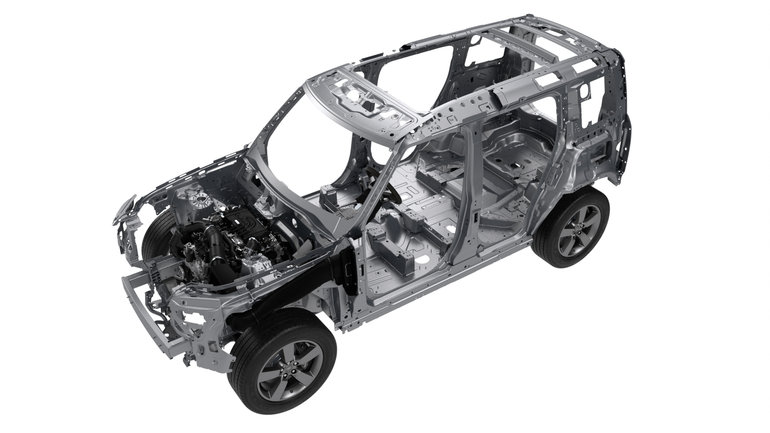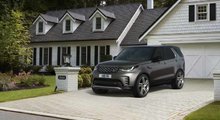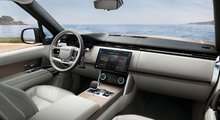Beyond the Pavement: A Deep Dive into the Defender's Advanced Aluminum Architecture
September 30 2025,

While most SUVs compromise between ruggedness and refinement, the Defender rewrites the rulebook through its revolutionary D7x aluminum architecture. This isn't simply about building a stronger vehicle—it's about creating a platform that delivers exceptional capability both on Quebec's highways and off its beaten paths, all while providing the comfort and safety that modern families demand.
The D7x architecture represents a fundamental shift from traditional body-on-frame construction to an advanced aluminum monocoque design that's three times stiffer than conventional approaches. For drivers in Quebec who need both weekend trail capability and weekday commuter comfort, this engineering represents the perfect marriage of durability and refinement.
D7x Architecture Advantages
|
Design Element |
Traditional Body-on-Frame |
D7x Aluminum Monocoque |
Real-World Benefit |
|---|---|---|---|
|
Torsional Stiffness |
Baseline |
3x stiffer |
Better handling and safety |
|
Weight Distribution |
Front-heavy |
Optimally balanced |
Improved traction and efficiency |
|
Crash Protection |
Limited crumple zones |
Integrated safety cell |
Enhanced occupant protection |
|
NVH Control |
Basic isolation |
Advanced damping |
Quieter, more refined cabin |
Revolutionary Monocoque Construction
Land Rover's purpose-engineered D7x architecture abandons traditional body-on-frame construction in favour of a lightweight aluminum monocoque that creates the stiffest body structure Land Rover has ever produced. This advanced construction method distributes loads throughout the entire structure rather than concentrating stress on a separate frame.
The aluminum construction provides multiple advantages over steel alternatives. Beyond weight savings, aluminum offers superior corrosion resistance—particularly valuable in Quebec's challenging winter conditions where road salt and moisture create ongoing durability challenges. The material's inherent properties also provide better energy absorption during impacts, enhancing occupant safety.
The monocoque design integrates the body and chassis into a single, unified structure. This approach eliminates the flex and movement common in body-on-frame vehicles, creating a foundation that responds predictably to driver inputs while maintaining composure over varied terrain.
Three Times Stiffer: Engineering Excellence
The D7x architecture's three-fold increase in torsional stiffness compared to traditional designs creates measurable improvements in multiple performance areas. This structural rigidity provides the foundation for the Defender's fully independent air and coil spring suspension systems to work effectively, ensuring optimal wheel contact and control.
Enhanced stiffness translates directly to improved safety performance. The rigid passenger cell maintains its integrity during impacts while programmed deformation zones absorb energy efficiently. This engineered approach to crash protection surpasses traditional frame-based designs that rely primarily on the frame rails for structural support.
The structural stiffness also supports advanced suspension technologies that would be impossible on flexible platforms. The Defender's sophisticated damping systems and electronic controls require a stable foundation to function effectively, particularly during demanding off-road situations where chassis flex could compromise control.
Perfect Foundations for Advanced Suspension
The D7x architecture's rigidity enables the Defender's fully independent suspension system to operate at peak efficiency. Unlike traditional solid axles that compromise either on-road comfort or off-road capability, the independent design provides optimal wheel control in all conditions.
The aluminum construction supports both air suspension and coil spring configurations, allowing customers to choose the setup that best matches their intended use. Air suspension provides automatic ride height adjustment and enhanced comfort, while coil springs offer maximum durability for commercial applications.
The architecture's strength allows for substantial wheel travel without compromising structural integrity. This capability proves essential when navigating Quebec's diverse terrain, from highway expansion joints to cottage country trails, ensuring consistent contact between tires and road surface.
Electrification-Ready Platform
The D7x architecture was designed from inception to support electrified powertrains, positioning the Defender for future mobility trends. The structural strength accommodates battery packs while maintaining optimal weight distribution and crash protection standards.
This forward-thinking approach ensures that hybrid and electric Defender variants maintain the capability and character that define the nameplate. The architecture's flexibility allows engineers to optimize battery placement without compromising ground clearance, approach angles, or interior space.
The lightweight aluminum construction becomes particularly valuable with electrification, where every kilogram saved extends range and improves efficiency. The D7x platform provides weight savings that directly translate to enhanced electric vehicle performance.
Extreme Testing and Validation
The Defender has undergone more than 62,000 individual tests for engineering validation, with the D7x architecture specifically engineered to withstand Land Rover's Extreme Event Test procedure. These tests subject the vehicle to repeated and sustained impacts that exceed normal standards for SUVs and passenger cars.
The testing regimen includes exposure to extreme temperatures, from 50-degree desert heat to minus-40-degree Arctic conditions, ensuring the aluminum structure maintains its properties across the full range of global operating conditions. Prototype vehicles covered millions of kilometres across harsh environments to validate the architecture's real-world durability.
Quebec's challenging winter conditions—with temperature swings, road salt exposure, and varied surface conditions—represent exactly the demanding environment the D7x architecture was designed to handle. The extensive testing ensures reliable performance whether navigating downtown Montreal traffic or exploring remote Laurentian trails.
Safety Through Structural Innovation
The D7x architecture's safety performance extends beyond basic crash protection to encompass everyday driving scenarios. The structural rigidity provides a stable platform for electronic safety systems, ensuring consistent sensor readings and predictable system responses.
The aluminum construction creates optimal energy absorption characteristics during impacts. Unlike steel frames that can transfer impact energy directly to occupants, the D7x design includes programmed deformation zones that absorb and redirect forces away from the passenger compartment.
The architecture supports advanced safety technologies including multiple airbag deployments, active safety systems, and structural reinforcements in critical areas. This comprehensive approach to protection addresses both collision avoidance and occupant protection.
Capability Redefined for Quebec Drivers
For Quebec drivers who demand both daily usability and weekend capability, the D7x architecture represents a fundamental advancement. The platform provides structural foundation for genuine off-road capability while supporting refinement needed for urban driving.
This architectural sophistication means Quebec families can confidently navigate everything from Highway 20 traffic to Charlevoix cottage trails without compromise. The D7x platform adapts to changing conditions while maintaining the safety, comfort, and capability that define modern vehicle ownership.
Experience D7x Engineering at Decarie Land Rover
The Defender's D7x aluminum architecture represents more than advanced engineering—it's the foundation for Land Rover's most capable and refined SUV ever created. This technological sophistication ensures that every journey, from Montreal commutes to wilderness adventures, benefits from world-class engineering excellence.
Visit our team at Decarie Land Rover in Montreal to experience how the D7x architecture transforms the relationship between capability and comfort, creating a vehicle that exceeds expectations both on road and off.





